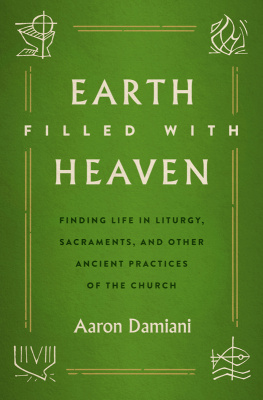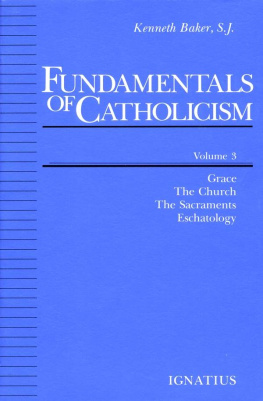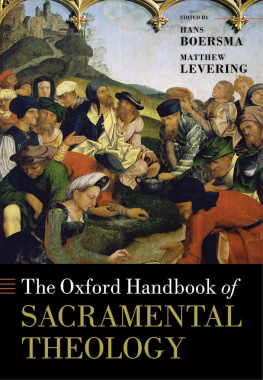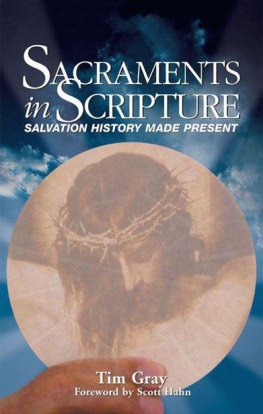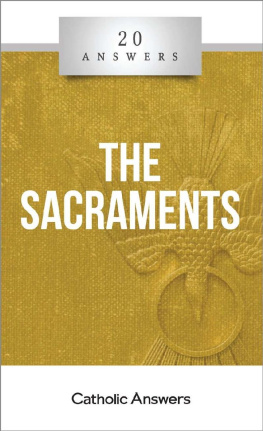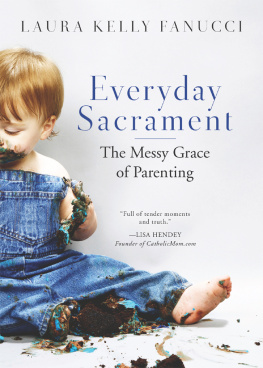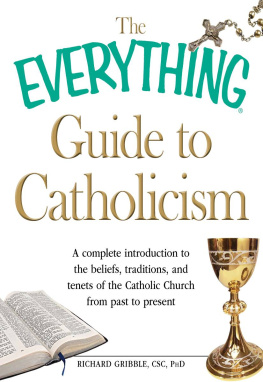Lawrence E. Mick






CONTENTS
v
Chapter 1
Chapter 18
Chapter 33
Chapter 55
Chapter 77
Chapter 94
Chapter 113
PREFACE
The renewal of the liturgy mandated by the Second Vatican Council (1962-65) included the revision of all the rites we call sacraments. The renewal of our sacramental life involves not only the development and implementation of new ritual books but also rethinking our understanding of these basic actions that shape our identity in the Church.
The council fathers called for this renewal in the first document they promulgated, the Constitution on the Sacred Liturgy, issued in 1963. In that document the council spoke of the importance of the sacraments for the Christian life:
The purpose of the sacraments is to sanctify people, to build up the body of Christ, and, finally, to worship God. Because they are signs they also belong in the realm of instruction. They not only presuppose faith, but by words and objects they also nourish, strengthen, and express it. That is why they are called sacraments of faith. They do, indeed, confer grace, but, in addition, the very act of celebrating them is most effective in making people ready to receive this grace to their profit, to worship God duly, and to practice charity.
It is, therefore, of the greatest importance that the faithful should easily understand the symbolism of the sacraments and eagerly frequent those sacraments which were instituted to nourish the Christian life (no. 59).
Helping people to readily understand the sacramental signs is the goal of this book. Understanding the sacraments is mostly a matter of understanding each of the seven on its own terms. Yet there are a number of basic principles that can help us to understand all the sacraments, for they share some fundamental characteristics in common.
Sacraments are human activities
The first principle we might observe is that the sacraments are human activities. We often think of the sacraments in terms of the elements of creation that we use: water in baptism, oil in confirmation or anointing, and bread and wine in the Eucharist. Yet the sacraments are better understood as the actions that we do with those elements, and those actions are all basic human gestures. Jesus chose basic human activities to be the symbols that convey his presence and action among us. So we wash bodies, anoint foreheads, eat bread and drink wine, touch and caress the sick, impose hands as a gesture of conferring power, etc. These human actions become the means of encountering the Lord.
Sacraments are ritual actions composed of symbols
Because we have experienced God's action through these actions in the past, we repeat them regularly. We do them as our ancestors did. These actions have become ritual actions, in which we follow prescribed patterns of movement and gesture, accompanied by prescribed words. This does not mean that the ritual can never change, of course. Rituals are revised and updated from time to time to keep them fresh and true to their original purpose.
Rituals are composed of symbols, often a series of symbols strung together. The symbols are the human actions we perform. In contrast to a sign, which merely points us to something somewhere else, a symbol contains what it signifies. It does not contain it completely, but the reality is present in the symbol.
A human kiss, for example, somehow contains the love it expresses, though it does not exhaust that love. So, too, the eucharistic meal contains the presence of Jesus, though it does not exhaust that presence.
Symbols are a very rich form of human communication and interaction. They offer us a way to express and deal with realities that are almost inexpressible-those deep divine and human realities like love and life and death and hope and fear and joy. Without symbols we would be struck mute before the most important realities of life. Symbols enable us to grapple with the things that really matter, and a recovery of our appreciation for symbols would go a long way in helping us appreciate the richness of the sacraments.
Sacraments are clarified by the word of God
Symbols, because they are rich beyond words, are also ambiguous. Their meaning is clarified in the sacraments by the proclamation of the word of God. The very formulas and prayers of the celebrations have been drawn from the Sacred Scriptures, and God's word is what makes the sacraments effective symbols. The revised rites for the sacraments all include a formal proclamation of the word of God as well. This increased attention to the word of the Lord restores a balance between word and action that had been lost in recent centuries. It also reminds us that our actions are always a response to what God has done.
Sacraments are communal actions
The response to God that we make in the sacraments is always a communal response. This may be the most important realization in coming to a renewed understanding of the sacraments. They are the actions of the church community, not just of the presider or the recipient. This is fundamental to understanding any liturgical celebration. As the Constitution on the Sacred Liturgy puts it: "It is very much the wish of the church that all the faithful should be led to take that full, conscious, and active part in liturgical celebrations which is demanded by the very nature of the liturgy" (no. 14). The word "liturgy" comes from the Greek meaning "work of the people," and it refers to the public worship of the church in its various forms: the Mass, the other sacraments, and the Liturgy of the Hours (psalms and prayers at various hours of the day). Liturgy is always the work of the people assembled as church. Though we may celebrate around an individual or a group of recipients of a sacrament, we all celebrate the sacrament together. A sacrament is the action of the church, and its meaning and effects are not limited to those around whom we celebrate.
Sacraments are the action of Christ
At the same time, because the church is the Body of Christ, the action of a sacrament is also the action of Christ. The Constitution on the Sacred Liturgy puts it this way: "By his power he is present in the sacraments, so that when anybody baptizes it is really Christ himself who baptizes" (no. 7).
Traditional theology expressed this truth in its teaching that sacraments are effective ex opere operato, which means, by the act being done. The sacrament is effective even if the minister is unworthy or sinful. It does not ultimately depend on the minister, for it is Christ who acts through the gathered community, which is his Body.



